Radically Inclusive Sharing Economies : LIBRARIES! // The Next Economy #2
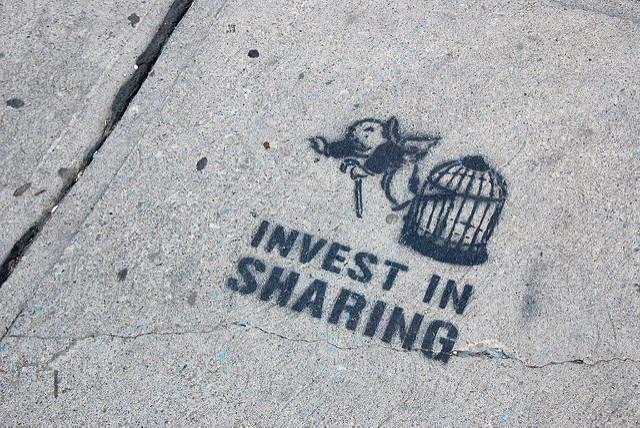
The next economy will support all of life. It will correct the imbalances of power and wealth we see today and create regenerative systems so that every living being can have everything they need.
The most assured way to usher in an economy that works for all of life is to identify inspiring examples, amplify and expand the models that we know all ready work. In this spirit, here is my ode to the library, most empowering and democratic of human institutions.
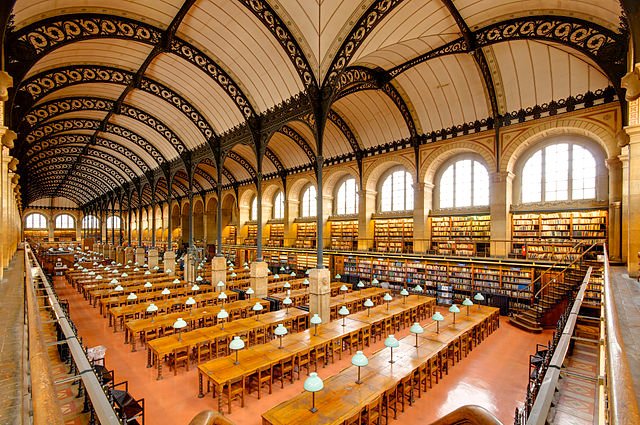
Libraries are Radically Inclusive
Everything the library offers is free to patrons, available for use by any person who lives in the area.
Where I live, libraries provide access not only to a vast collection of human cultural treasures - books, music, video - from all over the world, but also to tools like computers and the internet. This levels the playing field (though nearly not enough) for people who don't have the wealth to own computers.
The library provides access to space. It is a beautiful, tranquil place to be. Somewhere one can simply exist -- for free. In my incredibly privatized country, the U.S.A, it is quite challenging to find any place you can simply be without having to pay to be there.
Especially if it's cold and rainy, if you are without shelter (we have a massive homelessness crisis), or if you are an urban youth who doesn't want to be stuck in home, having a place you can just be is incredibly important. "The library is the best babysitter - for kids and adults," one activist from a dangerous neighborhood told me.
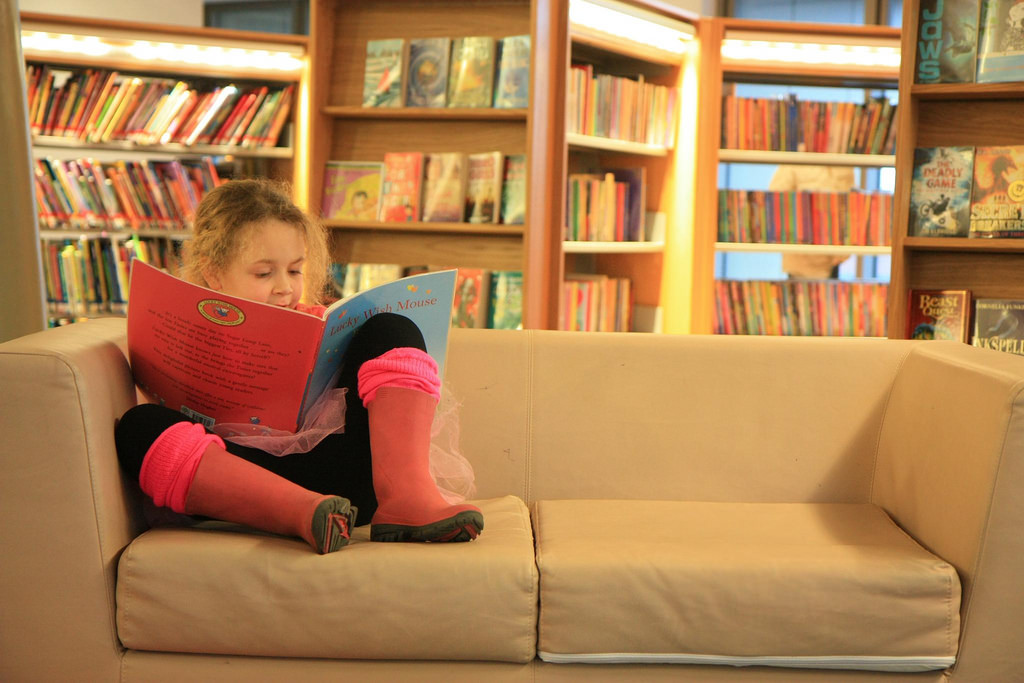
Libraries are Sharing Economies
Books in the library system get read by hundreds or thousands of people, hundreds or thousands of times. In their lifetimes, library books are used exponentially more than books sitting in private homes. By collectively sharing the use of library resources, we vastly reduce waste.
In Berkeley, we have a tool lending library where anyone can borrow drills, saws, ladders, you name it. How often do most people use their tools, anyway? Like books, tools tend to just sit around when they are considered private property.
Any resource left sitting is not being utilized. This is a kind of waste, a massive inefficiency. We could vastly reduce production needs - and resources needed for production - if we were to share more things than we do now.
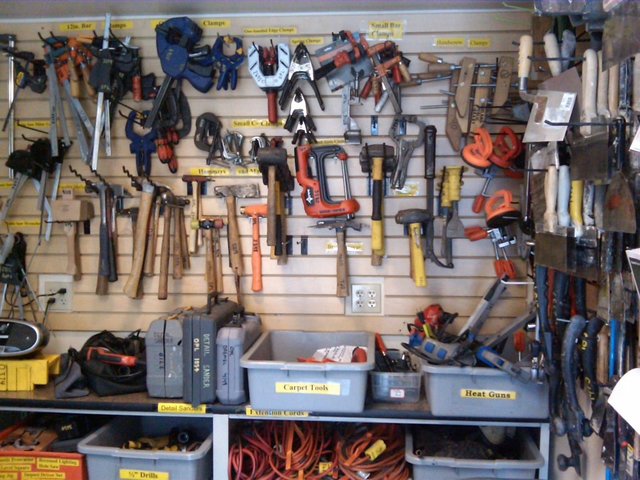
Sharing is about access - not property
Libraries teach us an incredibly valuable lesson: for most of the reusable goods we need and want, what we need is simply access. Not ownership!
Who cares who owns a book, or a tool? The important thing is that it be put to use!
Actually, I do care who owns these things - because those without wealth often don't have access, and that means that they are at a major disadvantage for meeting their needs and wants, or that they have to do extra work in order to do so.
By providing more and better access to more people, we can also help to reshape structural inequalities that disadvantage so many in our current economic system. Or, better said, we change the conditions such that more people can be more self-determined, and themselves have more power over their lives. Then, working together, our human potential is vastly amplified.
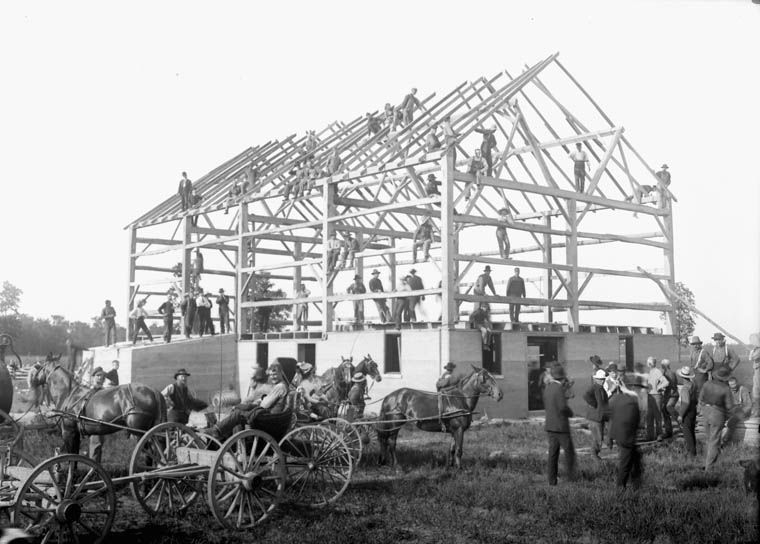
Going further with the library idea
Libraries are amazing, I love them and I hope you do too. And yet, they could be even better.
Libraries could be networked together. With the internet, we could pool resources amongst collections. If a particular book wasn't available at your library, you could find it at another and they could mail it to you. Actually, my library already does this, and has a partnership with 50+ other libraries. But the network could always be bigger!
We could have libraries for more things. Especially expensive things that get rarely used. What if there were musical libraries? Rooms with instruments that people could reserve to learn, play, practice, jam. I'm a pianist, and because I live in an apartment up many flights of stairs, I don't own a piano. But I would go to the piano library every danged day. And I would pay for it, too, within my ability.
Library management could be less hierarchical and more cooperative. We lost 40,000+ books because a library director made executive decisions without listening to his staff. Then, workers who spoke out were threatened and intimidated, some being forced out of their positions for defending public resources. The director, being a bureaucrat and having little on the ground experience, had no idea of how his decisions would affect patrons. Beyond mitigating abuse of power, there are of course many other reasons to distribute decision-making power in workplaces, but really unpacking that will have to be it's own article.
What do you think? How else could libraries be better? How could we expand the idea of a library? How might having wider access promote a better society? And when we have access, do we really need property anyway?
I ask these questions to try to help us imagine the next economy, an economy that works for the benefit of all life. In the first post in this series, I unpacked how traditional notions of economics fail us, and how we might expand them. Libraries are just one excellent example, in my opinion. Can you think of other examples of the next economy that are all ready here?
~Jared
Feature picture taken by Jonathan McIntosh
@jaredwood when you first posted this my initial reaction was "I hate libraries" but then I thought about it more and realized that my perspective specifically had to do with my grad day struggles - it had nothing to do with the actual function of the library lol.
With that being said, I did realize that libraries have been incredibly useful and helpful for me.
When I moved to Austin, I started a community improv group. We didn't have any free space to utilize at the time, and so we started at the library. It was the only free space available that we could utilize consistently.
It did get a bit awkward at times, especially when we were in the room that was right next to the book club or the guy giving an interview. In these instances the leader from the other room would step in and say "you guys mind keeping it down a bit." and I would think to myself, "Jesus, we're just warming up..."
Ultimately the library was what allowed us to keep the meetups going for over a year and a half until we found an official location to host our classes. So I will give it kudos there.
And random note: once I slept overnight in a library with a friend. This was quite literally one of the most epic experiences ever. I would recommend it to anyone looking for a crazy night lol.
I envision a library of the future being less about books and physical items, and more about a library of experiences. I think libraries should be a place to share, not to hush. Sure, there should be designated quiet areas, but the library should be a place where information is exchanged freely.
Ultimately, I think the concept of the library is on it's way to being a great model for our future.
Thanks for sharing @jaredwood. Great concepts here brother!
Wow, this article shifted the way you think about libraries? That's amazing to hear @axios!
I appreciate your reflections. Though the library wasn't everything you might want it to be, as you said it did enable your group to function - for free! - which really frees you up in terms of what you can do and who you can offer it to.
I'm curious what a library of experiences might look like. How is this different from an art gallery, performance venue, etc? I'm guessing you're looking for participatory experiences more than performer-audience kind of experiences. Much of the utility of libraries is in how they function as storage places - is storage part of the library of experiences? :)
How is a library of experiences different than a free school? Maybe what you want is a free school! Or, a free space without the "school" connotations.
Wow, this article shifted the way you think about libraries? That's amazing to hear @axios!
I appreciate your reflections. Though the library wasn't everything you might want it to be, it did enable your group to function - for free! - which really frees you up in terms of what you can do and who you can offer it to.
I'm curious what a library of experiences might look like. How is this different from an art gallery, performance venue, etc? I'm guessing you're looking for participatory experiences more than performer-audience kind of experiences. Yet libraries tend to act as storage places - is this a function of the library that would remain in the library of experiences?
Or, how is a library of experiences different than a free school? Maybe what you want is a free school! Or, a free space...
Libraries are important assets for serious people. They are essential for those who are interested in reading different kinds of publications.
They are really needed by people who want to research, read relevant books, and probably search far and wide for knowledge. They will serve the people in any society at large. The fact that they will provide the books, which some people cannot afford to buy, makes them valuable resources.
I think, libraries are sources of true development for a community and everyone there.
Agreed! I'm wondering, where are you from? Are there enough libraries where you live? How are they?
I received your message, @jaredwood. I am a new person here. I am glad to read from you @steemit.
I am living at Oyo, Oyo State, Nigeria. Nigeria is a developing country in West Africa. Oyo, my hometown, happens to be the place where I live and work.
In fact, I am a graduate teacher and counsellor, at a public secondary school. I had B. Ed., Guidance & Counselling.
But, I had little opportunity of reading in the school libraries during my days. I believe, community libraries are the real sources of development in any country. They are available in large numbers in the developed world so far.
My exposure to the library isn't the reason for my education. I have read personal books for my examination in many cases. I really enjoy reading books on the Internet. I want to write books. I am aspiring to be an author, in my area of specialisation "psychological aspect of man".
I am grateful for your consideration.
Thank you for sharing more, @gboyegaogunmola. Best of luck to you in your writing endeavors. I am also largely self-taught, so I can appreciate your comment that the library isn't the reason for your education.
What you said interests me:
"I believe, community libraries are the real sources of development in any country."
Can you explain a bit more why, or how this works in Nigeria?
I think sharing resources is incredibly important to any community, and libraries are just one good example of this. Maybe there are more examples where you come from?
Thanks for the interest and concern, @jaredwood. I am happy to know that you had self-education as well.
I believe, education is either based on having access to public resources, or getting personal remedies. I think, development is sufficient when there is enough resource to cater for everyone there. I mean, people of different background should have easy access to this resource. On the other hand, some people may suffer through certain difficulties and problems, which must be encountered in a situation of little resource and development.
Libraries aren't sufficient for educating people, in many communities of the developing countries. I have noticed that they are few, and could be used by those who are financially capable of using them.
I have always been interested in libraries for its service and stock of literary resources, which I have a personal interest for. But, I know that the people in the developed countries should have little of this problem.
I hope, these countries will develop and improve their economy and education as time goes on.
I received your message, @jaredwood. I am grateful for your concern and support. Thanks, for publishing this post about sharing economies of libraries and equal access of communities. I know that, libraries are true sources of development in the world of today.
I noticed your emphasis on certain things. I meant that, libraries exist in my community, and I mentioned my school library during those days, but I said there was little opportunity to use it, considering how I wanted it. Really, the libraries I've heard about belong to big institutions, and may not be accessible to the public. As of public libraries, I don't know of anyone yet. That was why I said, they are meant for those people who have the financial status.
I am really impressed to give you this information. I appreciate your consideration. I believe, you have good knowledge and experience about libraries.
I think, there should be some ways by which people from different categories of life and background will be able to benefit from the library. If two categories of people with different financial status are given the same library service, the rich people will trample on the poor ones, to the detriment of getting any service that is really needed.
I am sure, sharing literary resources through the Internet is a great height of modern development. I hope, such ways of sharing and accessing global content and people should be encouraged, because it turned the world economy into a global village.
Again, I have truly enjoyed the mutual contribution and knowledge sharing through Steemit. I am happy to be a Steemian.
Good luck.
Thank you for sharing, @gboyegaogunmola - it is helpful for me to hear about the situation where you live. I do believe that you and people like you are the best ones fit to help address issues of access and equitability, as you understand your situation far better than I ever could. I'm curious about:
"I have noticed that they are few, and could be used by those who are financially capable of using them."
What do you mean by financially capable? Are the libraries are so few and spread out that it takes financial resources for people to meet them?
I agree that if libraries are only houses for books, they are nowhere near sufficient for education. What if they also offered classes? Or what if they offered access to other resources, like tools? What other resources could libraries provide shared access to in Nigeria that would most benefit the people?
hey @jaredwood very insightful.
i like the way you have broken your thoughts down and connected the dots towards expanding the horizons of the idea. Sharing is indeed about access..we definitely can work towards a sharing economy. we always were like that...the shift since 1800's has broken our societal structures way beyond imagination and has led to where we stand today..its going to be a struggle to regain our rootedness ..but it need a lot of awareness, self indulgence from every individual and commitment.
Then i think even if it starts as a small community, its a start on some level...lets hope for the best and work towards it. cheers mate.
i am finding your posts quite interesting, i follow you now.
Yes, we can do this locally and build also the living culture of sharing! So many great, easy ways to do that - one of my favorites that my friends and I do is a clothing swap. Everyone brings the clothes they don't wear anymore, and finds new clothes. We elongate the lifespan of these fabric friends and we have fun trying them on, complimenting each other... when I wear a friend's shirt that has a story, it makes me way happier than if I buy some shirt made far away. Small steps count! We can build this culture! Good point, thanks for writing :)
Yes..very true. And that's an amazing idea and an initiative man. Kudos to all whole are doing it.
You know, the more i am experiencing and growing in life, the more my feeling to go back to the traditional wisdom and ancient derived ways of living. The fundamentals never change, that's why they are known as fundamentals. Today, we are the agents of being this change. And we can spread this , my goodness what a place and an environment we would have made ..a truly avant garde way of living in our true spirits of life !
aah how i see this happening someday soon ! It will happen soon !
:)
Very Nice post showing your hard work
It is interesting and informative for me
Glad to hear!
Keep following @sohailomi
This post has received a 6.42 % upvote from @booster thanks to: @jaredwood.